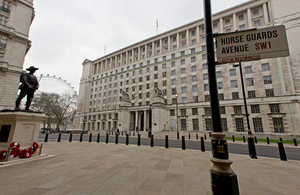Government takes action to mitigate workforce disruption
- Prime Minister tasks ministers to develop robust contingency plans for workplace absences and other disruption caused by high levels of Omicron cases
- government is stepping up response, led and coordinated by the Chancellor of the Duchy of Lancaster
- departments working closely with their sector specialists to anticipate and mitigate any potential disruption and manage workforce absences
The Prime Minister has tasked ministers to work closely with their respective sectors to test preparations and contingency planning so that disruption caused by increased COVID-19 infection is minimised in public services and supply chains.
The Chancellor of the Duchy of Lancaster, Steve Barclay, is chairing regular meetings with ministers to closely monitor the impacts of Omicron on workforces and supply chains and monitor schools ahead of the return of pupils in the new year.
The government is also working with the public and private sector to develop plans to manage absences in order to ensure sectors are prepared and disruption is minimised.
The Committee has already agreed a number of interventions and will meet regularly to monitor developments and agree where further action needs to be taken.
So far, disruption caused by Omicron has been controlled in most parts of the public sector, but public sector leaders have been asked to test plans against worst case scenarios of workforce absence scenarios of 10%, 20% and 25%.
They have identified a range of mitigations, including identifying additional staff – such as volunteers in the public sector or former teachers in schools -prioritising service delivery and reducing bureaucracy.
While the booster programme continues to go from strength to strength, with more than 33 million people – almost two-thirds of adults in the UK – now receiving their third dose, the high levels of positive COVID-19 cases and increased transmissibility of Omicron could mean that UK businesses and public services face disruption over the coming weeks.
With a third vaccine dose boosting protection by up to 75%, all government departments, led by the Department for Health and Social Care, are also renewing efforts to make sure that critical public sector and key workers get their booster jabs.
Chancellor of the Duchy of Lancaster Steve Barclay said:
As people return to work following the Christmas break, the high transmissibility levels of Omicron mean business and public services will face disruption in the coming weeks, particularly from higher than normal staff absence.
We have been working through the Christmas period to prepare where possible for this, with all departments liaising closely with public and private sector leaders who are best placed to operationally manage their workforces.
The best way to combat Omicron is to get boosted and I encourage anyone who is eligible to get boosted now.
A number of steps have already been taken to minimise any potential workforce or supply chain disruption, including:
- reducing the isolation period from 10 to 7 days with 2 negative tests
- introducing daily contact testing to prevent widespread need for self-isolation where someone hasn’t tested positive for COVID-19
- investing over £462 million to support workforce recruitment and retention in the adult social care sector
- using digital staff passports for NHS staff which allow them to move between hospitals easily
- extending the Infection Control Fund until March 2022 to support staff self-isolation payments, testing and covering the costs of staff vaccination in care homes, supported by £388 million
- boosting the numbers of HGV drivers through quicker testing and skills bootcamps
- asking qualified teachers who are no longer in the profession to sign-up to temporarily fill absences and support schools to remain open in the new term
- adding care worker roles to the Shortage Occupation List to bolster our social care workforce
- working to speed up the registration of overseas nurses to practice in the UK – as a result 800 nurses have been able to register with the Nurse and Midwifery Council this week alone
Regular data is being fed into the Cabinet Office to identify early any potential disruption and take any steps to mitigate them. The contingency planning utilises the New Government Situation Centre and a central taskforce of civil servants based in the Cabinet Office and working across government and with the devolved administrations.
Should disruption occur the government stands ready to make sure that any necessary burdens to businesses are cut. There is work ongoing to identify potential regulatory, policy or operational changes which could minimise or alleviate potential disruption.
